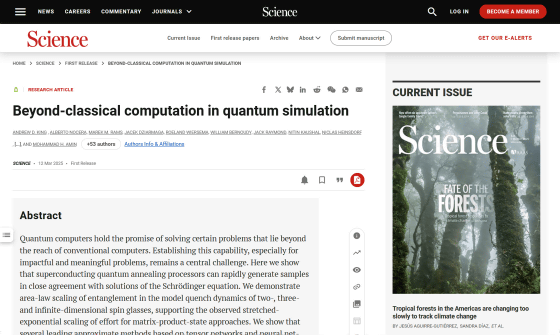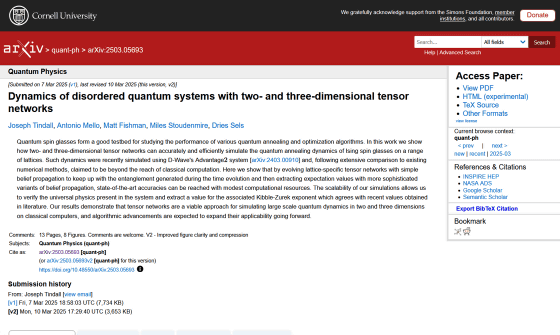Quantum computing company D-Wave claims to have achieved 'quantum supremacy' on practical problems, but some experts disagree

In a paper published in the peer-reviewed academic journal Science in March 2025, quantum computer company
Beyond-classical computation in quantum simulation | Science
https://www.science.org/doi/10.1126/science.ado6285

Beyond Classical: D-Wave First to Demonstrate Quantum Supremacy on Useful, Real-World Problem
https://www.dwavequantum.com/company/newsroom/press-release/beyond-classical-d-wave-first-to-demonstrate-quantum-supremacy-on-useful-real-world-problem/
Conventional classical computers process information in the form of binary numbers, which represent either '0' or '1.' In contrast, quantum computers perform calculations using ' qubits, ' the smallest unit of quantum information that can take on both '0' and '1' states. This increases the number of patterns that can be represented by the basic unit, allowing quantum computers to store and process vast amounts of data at much faster speeds than conventional computers.
'Quantum supremacy' is a term used in quantum computing to describe the ability of a quantum computer to solve tasks that would be impossible or would take too long for a conventional classical computer to solve, in an overwhelmingly shorter time. Quantum supremacy is considered a major milestone in the field of quantum computing and is the goal of quantum computer scientists.
This time, D-Wave ran the task of simulating the properties of hard magnetic materials on a quantum computer that specializes in combinatorial optimization problems, a ' quantum annealing method .' This simulation was a very complex task, but D-Wave's quantum computer was reported to have been able to complete it in less than 20 minutes.
On the other hand, if the same task were performed on the Oak Ridge National Laboratory 's Frontier supercomputer, it would take nearly a million years to complete the calculation with similar accuracy. Based on this result, D-Wave claims that its annealing quantum computer has demonstrated quantum supremacy.
Magnetic material simulations such as those used in this study are important for understanding the quantum properties of magnetic materials, which are widely used in medical imaging, electronics, superconductors, etc. 'Today is an amazing day for quantum computing. This is the first time in the industry that we have demonstrated the superiority of quantum computing on a useful problem,' said CEO Dr. Alan Baratz.

However, some scientists have responded to D-Wave's announcement. In an unpeer-reviewed paper uploaded to the preprint server arXiv, a research team led by quantum physicist Doris Sells of New York University and Miles Stoudamire, a researcher at the Center for Computational Quantum Physics at the Flatiron Institute , argued that a laptop computer could perform the same task as D-Wave in just two hours by using a technique called tensor networks .
[2503.05693] Dynamics of disordered quantum systems with two- and three-dimensional tensor networks
https://arxiv.org/abs/2503.05693

Doubts cast over D-Wave's claim of quantum computer supremacy | New Scientist
https://www.newscientist.com/article/2471426-doubts-cast-over-d-waves-claim-of-quantum-computer-supremacy/
D-Wave Claims 'Quantum Supremacy,' Beating Traditional Computers - WSJ
https://www.wsj.com/articles/d-wave-claims-quantum-supremacy-beating-traditional-computers-155ca634
Stoudamire said D-Wave tested the best methods available at the time of submitting the paper, but has since discovered ways to overcome weaknesses of classical computers in simulating materials.
Trevor Lanting, chief development officer at D-Wave, said Stoudemire and his team did not simulate all of the lattice shapes, sizes, and simulation depths that D-Wave demonstrated in their paper. 'We believe that the ability to reproduce the set of results we have produced is not possible on a classical computer,' Lanting said.
A Swiss research team also reported in a similar, unpeer-reviewed paper published on arXiv at the same time that a similar task could be solved by a classical computer. A D-Wave spokesperson countered that the tasks performed by the Swiss research team were too simple and did not challenge D-Wave's quantum supremacy.
Challenging the Quantum Advantage Frontier with Large-Scale Classical Simulations of Annealing Dynamics
https://arxiv.org/html/2503.08247v1
Related Posts:







